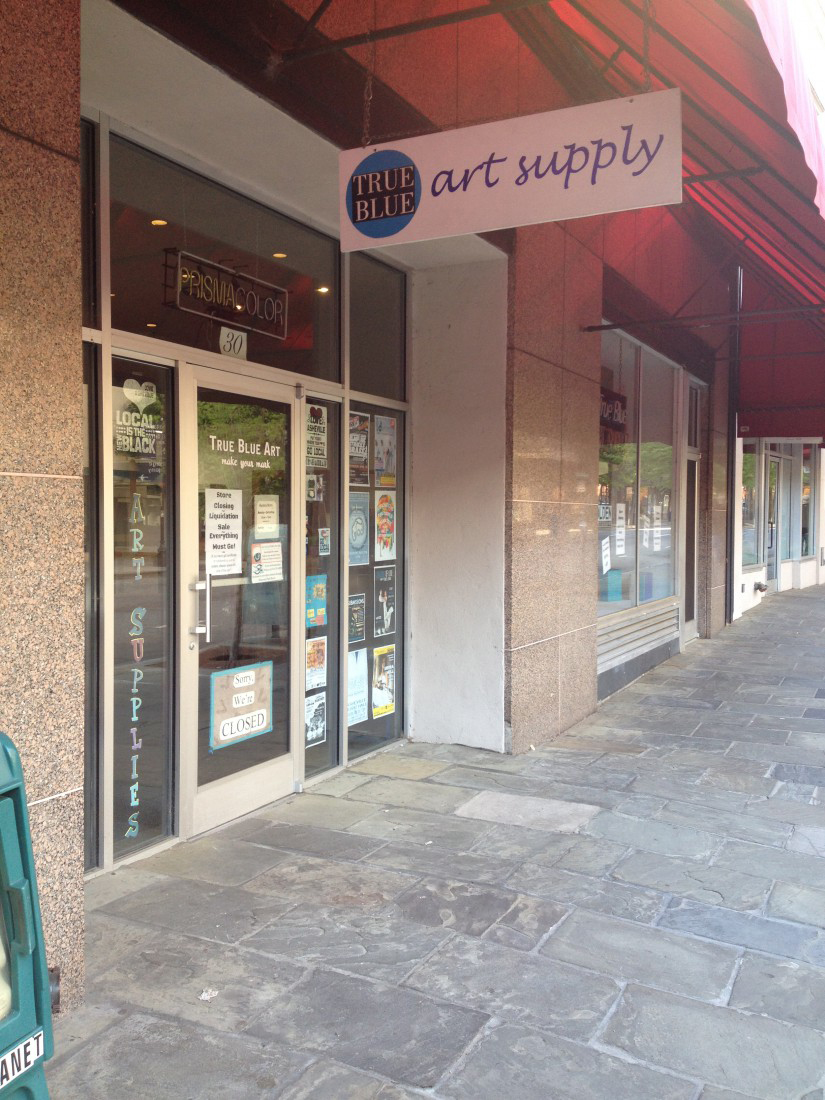After 16 years as one of Asheville’s leading art supply shops, True Blue Art Supply will close its doors for good this Friday, May 9. The closure means that Hendersonville’s The Starving Artist is the area’s last independently-owned art supply shop in a sea of Michaels Arts and Crafts, AC Moores and online industry giants like Cheap Joe’s and Dick Blick.
“This is not a happy decision to make, but the market has changed,” Claire Reeder, True Blue’s owner told Xpress. She added, “Everything is going online.”
It’s a fate that’s becoming all too familiar for independently-owned brick-and-mortar retailers across the nation — particularly those operating in markets dominated by online competitors like Netflix, Amazon and, in this case, Cheap Joe’s Art Stuff.
Storefront business owners like Reeder have been seeing fewer and fewer customers as more shoppers turn to the Web in search of the lowest possible price. As demand trails off and supply orders shrink, business owners are left ineligible for the bulk discounts that initially gave them competitive pricing — and which their competitors are purchasing en masse. It’s a trend that plunges market values for such goods while simultaneously vaulting formerly-stable prices offered by traditional retailers.
“It’s impacted the entire industry,” Reeder says.
Everyone from the mom-and-pop art shops to the chain stores have in some way felt the impact of online competition, Reeder says. For some, it’s lead to lowering prices, opting for cheaper products or expanding web capabilities. For others though, it’s meant going out of business.
“Brick and mortar is kind of going away,” she says, “it’s too hard to pay the overhead that retail spaces like this demand and still meet with that competitive online pricing.” Reeder cited the recent closing of Pearl, a New York art supply shop. The 81-year-old institution closed its 6-story, 11,850-square-foot flagship store in Manhattan on April 15. It now operates solely as an online seller.
News of True Blue’s closing also comes at the end of what both Reeder and the Commerce Department noted was a financially devastating fall and winter. “It made for six really, really tough months,” Reeder says, “and a small business can’t [survive] that impact the way a large one can.”
Reeder purchased True Blue in 2004 with her then-husband Jim Shura, shortly after original owners Heather Gordon and Coral Jensen moved the store from Charlotte Street to its current location on Haywood Street. The store’s been open since 1998. Before moving to Asheville, Reeder and Shura owned and operated Chapel Hill-based Studio Supply, which they closed under similar pressures in Dec. 2011.
Reeder notes that such closures, piled onto the rise of online shopping, offer a grim preview of the future of storefront retailing. “Saving a couple bucks short term will basically create a world where there is no other option,” she said. And with that, you lose the type of customer service that store’s like True Blue have historically prided themselves on.
“My employees were artists,” she said. “They knew the products because they used them. I think that differentiated us from a chain store, or a 30-word online description.”




Before you comment
The comments section is here to provide a platform for civil dialogue on the issues we face together as a local community. Xpress is committed to offering this platform for all voices, but when the tone of the discussion gets nasty or strays off topic, we believe many people choose not to participate. Xpress editors are determined to moderate comments to ensure a constructive interchange is maintained. All comments judged not to be in keeping with the spirit of civil discourse will be removed and repeat violators will be banned. See here for our terms of service. Thank you for being part of this effort to promote respectful discussion.